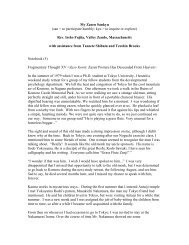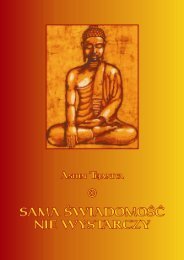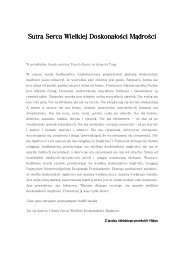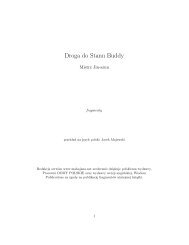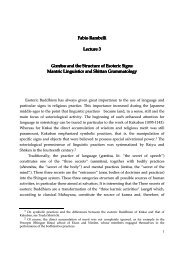Mahamudra Teaching - Dharma Media
Mahamudra Teaching - Dharma Media
Mahamudra Teaching - Dharma Media
You also want an ePaper? Increase the reach of your titles
YUMPU automatically turns print PDFs into web optimized ePapers that Google loves.
Then we come to what is called the “mind free-from-elaboration” or “unelaborated mind.” That is<br />
basically <strong>Mahamudra</strong>. What does that mean? Sometimes the mind is free from all elaboration. It is an<br />
unelaborated mind. So actualize that state. When you think about this and then think about that<br />
philosophy and then look at your mind you feel, “How busy my mind is, one thought after another.”<br />
Sometimes you feel it is not possible for you to achieve the “unelaborated mind” or be free from<br />
elaboration. “My mind is elaborating so much!” Sometimes that may make us get discouraged or<br />
depressed. We don’t have to worry about that. This doesn’t mean you don’t think at all! Rather what<br />
it means is “don’t follow after the thoughts.” A lot of thoughts may arise. But when they arise, then<br />
they dissolve. Don’t elaborate the first thought when you get it. If you elaborate the first thought then<br />
it describes and comments on this and that, and this is called “making elaborations.” If you don’t<br />
make any commentary on the first thought, just let it rise, let it dissolve, then it is called “free from<br />
elaboration.” So that means you don’t press the thought, you don’t chase the thought. Just let that<br />
rise, let that go, and sustain your mind in the <strong>Mahamudra</strong> State. That is called actualizing the<br />
“unelaborated mind.”<br />
Sometimes, in discussing this and providing a lot of explanation on it, then that kind of adds to the<br />
confusion. What happens is that first you understand it, the unelaborated nature, and then you add a<br />
lot of elaboration to it!<br />
Progressing in Practice<br />
The Four Yogas<br />
When one studies <strong>Mahamudra</strong> in detail, particularly when considering practice, one is introduced to<br />
what are called the “Four Yogas” or four stages of meditation in <strong>Mahamudra</strong>. They are the onepointed<br />
yoga stage, the unelaborated stage, the one-taste stage, and the no-more-meditation stage.<br />
How does one identify the first stage of yoga, the one-pointed stage of yoga? When we achieve<br />
shamatha and establish calmly abiding well then at that time you can see your thoughts. At that time<br />
you can identify all your different thoughts because mind has become so calm and fine, enabling you<br />
to do that. And in that state, as you see your mind, that is called the one-pointed yoga stage.<br />
After that, when that is well established, then as any thought arises, you just see it. Any conceptual<br />
thought that arises has no any essence. There’s no essence at all. So to see that nature that has no<br />
essence at all is called “uprooting the thought.” There is nothing to follow. And that realization is<br />
called free-from-elaboration or the unelaborated state. That’s like the ocean and the waves. The<br />
waves may arise constantly but just each moment that they arise, they also dissolve into the ocean. A<br />
wave doesn’t go to any other place. So like that, thought arises within the mind and dissolves into<br />
that, without elaborating that.<br />
Distinguishing Between Practice and Non-Practice<br />
There is a difference between the ordinary person’s thought and the one who actualizes this state.<br />
The ordinary person gives rise to thought and then follows after the thought and then follows after<br />
the next thought, and goes on and on with this. But for the one who actualizes this state, this<br />
teaching, when thought arises, then that thought is liberated. There’s no longer anything to follow.<br />
The individuals are similar with respect to the arising of thoughts. The difference between the<br />
practitioner and the non-practitioner is with regards to the elaborating of thoughts.


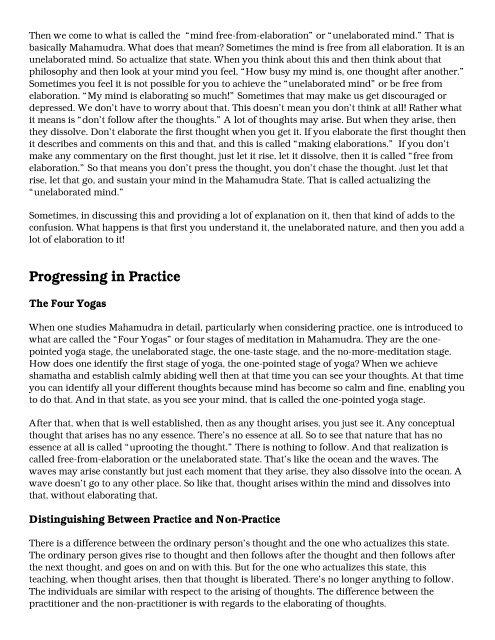
![Shushogi, Dogen Zenji [PDF] - Mahajana.net](https://img.yumpu.com/50921105/1/190x219/shushogi-dogen-zenji-pdf-mahajananet.jpg?quality=85)

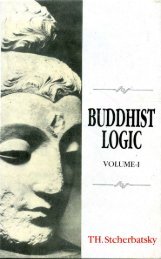
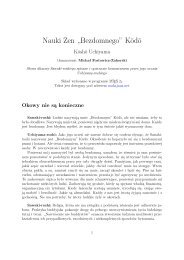
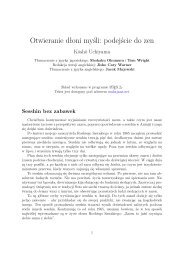
![wywiadu z Murakami Kosho Roshim [PDF] - Buddyzm w Polsce i na ...](https://img.yumpu.com/45809746/1/184x260/wywiadu-z-murakami-kosho-roshim-pdf-buddyzm-w-polsce-i-na-.jpg?quality=85)



